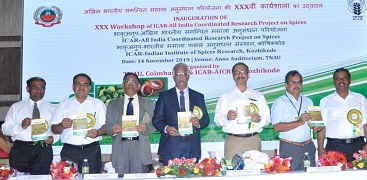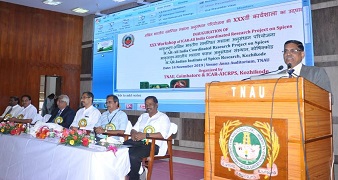14 - 16 November, 2019, Coimbatore
The ICAR-All India Coordinated Research Project on Spices, Calicut organized the 30th Workshop at Tamil Nadu Agricultural University (TNAU), Coimbatore from 14th to 16th November, 2019.


The Chief Guest, Dr. T. Janakiram, ADG (Horticultural Sciences), ICAR highlighted the importance of spices in the Indian economy. He also emphasized on the need for developing the trait specific varieties.
Dr. N. Kumar, Vice-Chancellor, TNAU asserted that with a little modification in the cultivation practices and adoption of scientific practices, the productivity of spices can be enhanced.
The Special Guest of the Plenary Session, Dr. P. Rethinam, Former ADG (Horticultural Sciences), ICAR & Former Director, ICAR-Indian Institute of Oil Palm Research, Andhra Pradesh emphasized on maintaining the quality of the Indian spices for meeting the global challenge. He also urged for the united efforts of the spices sector including research, development and industry in the designated direction.
Dr. Homey Cheriyan, Director, Directorate of Arecanut and Spices Development and Dr Gopal Lal, Director, ICAR-National Research Centre on Seed Spices were also present during the occasion.
Dr. K. Nirmal Babu, Project Coordinator highlighted the achievements made during the year and remarked that still a long way to go to meet the challenges faced by spice growers as well as spice industry.
Earlier, Dr. K.S. Subramanian, Director of Research, TNAU welcomed the gathering.
The Pottangi, OUAT, Bhubaneswar and Kumarganj, NDUAT Centres received the Best ICAR-AICRPs Award.
The 3 varieties - One in Fennel (RF-290) with high yield and more Umbels (from SKNAU, Jobner); One in Ajwain with high yield and quality (Ajmer Ajwain-73) and One in Nigella (Ajmer Nigella-1) with high yield and quality (both from ICAR-NRCSS, Ajmer) were recommended for release during the occasion.
The following technologies were also recommended for adoption
- Technology for the management of bacterial wilt in ginger caused by Ralstonia pseudosolanacearum (ICAR-IISR, Calicut).
- Response of coriander varieties to various levels of fertilizer management under different cutting management (Jagudan).
- Micro irrigation and fertigation management in cumin (Jobner).
- Management of coriander powdery mildew using new generation fungicides (Jobner).
- Organic nutrients and disease management in cumin (Jobner).
Some of the major recommendations emerged during the discussion were,
- Unique types must be registered with ICAR-NBPGR.
- Development of trait specific varieties has to be given priority.
- Mutation breeding should be explored for creating variability particularly for biotic and abiotic stress resistance.
- Seed chain must be followed for maintaining varietal purity.
- Soil, plant and quality analysis must be included in all nutrient management trials.
- Economics has to be worked out in all crop production experiments.
- Based on the guidance from Joint Secretary (Pesticides), bio-efficacy trials of pesticides in different crops may be conducted at ICAR-AICRPS Centres for multi-location data generation.
- Generation of residue data in all pesticide evaluation trials need to be emphasized.
Dr. L. Pugalendhi, Dean (Horticulture), TNAU proposed vote of thanks.
(Source: ICAR-All India Co-ordinated Research Project on Spices, Calicut)








Like on Facebook
Subscribe on Youtube
Follow on X X
Like on instagram